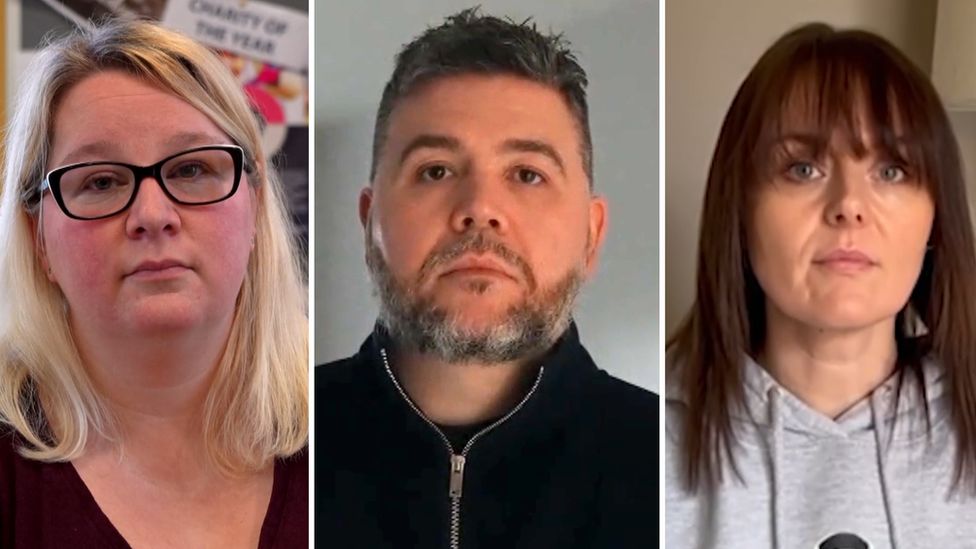
Rachel Hext, Peter Easton and Julie Taylor are all trying to sue their employers for compensation
By Catherine Burns
Health correspondent
Nearly 70 healthcare workers with long Covid will take their fight to the High Court later to sue the NHS and other employers for compensation.
The staff, from England and Wales, believe they first caught Covid at work during the pandemic and say they were not properly protected from the virus.
Many of them say they are left with life-changing disabilities and are likely to lose income as a result.
The Department of Health said “there are lessons to be learnt” from Covid.
The group believe they were not provided with adequate personal protective equipment (PPE) at work, which includes eye protection, gloves, gowns and aprons.
In particular, they say they should have had access to high-grade masks, which help block droplets in the air from patient’s coughs and sneezes which can contain the Covid virus.
But the masks they were given tended to be in line with national guidance.
I first met Rachel Hext in September 2022, as part of a BBC Panorama documentary on long Covid among NHS workers.
Ms Hext, who is 36, has always insisted that she caught Covid in her job as a nurse in a small community hospital in Devon.
She tells me she loved her work, but now feels like she has lost her career.
“It’s devastating. I live an existence rather than a life. It prevents me doing so much of what I want to do. And it’s been four years.”
Her list of long Covid symptoms includes everything from brain fog and extreme fatigue to nerve damage, and deafness in one ear.
Long Covid, a chronic condition following a Covid infection, affects an estimated 1.9 million people in the UK and can lead to heart palpitations, joint pain and concentration problems.
Many people, including those in this group, say their symptoms have left them disabled.
Rachel Hext has had oxygen therapy to try to ease her long Covid
Similar stories
Members of the group each say long Covid has destroyed their lives. A number of them can only manage to work reduced hours.
Peter Easton, 41, is among this group – he worked in emergency theatres in Cardiff.
Julie Taylor, who’s 45, was a community nurse in Hull.
During the pandemic they had different jobs to Rachel, but their stories are similar. They are all convinced they caught Covid at work.
Mr Easton says he had “amazing” health before the pandemic. He loved running – often half-marathons or 10k races.
“Now, I get up, take the kids to school. I come home and I sit on the chair with a heated blanket because that helps my legs. Another thing is, I can’t deal with the cold,” he says.
“That’s it. That is my life. I’ve tried going back to work. I just can’t.”
Image source, Peter Easton
Peter Easton said he used to run half-marathons before catching Covid
Ms Taylor’s experience echoes this – she says she used to do 12 gym classes a week. However, she now considers herself as disabled.
Asked why they want to sue their employers, they all give a similar response.
“We were not protected while working on the frontline, while doing our jobs,” Ms Taylor says.
She wants an acknowledgement and an apology.
Mr Easton also wants someone to take responsibility – but says there is a financial aspect too.
He said he estimates he would have earned about £1.5m during his working life, which he believes will now not be possible.
Ms Hext, too, feels she has been robbed of a chunk of her career: “I had 30 years of working life ahead of me. And now I don’t…I’m really sad that it’s come to this.”
‘Quite harrowing’
The group members are trying to sue their individual employers – which are mostly NHS trusts in England, some Welsh health boards and some other health providers.
Ms Hext, Ms Taylor and Mr Easton’s employers all told the BBC that they are not allowed to go into details because of the legal case. But they stress that the health and wellbeing of staff is a priority.
Solicitor Kevin Digby, who represents more than 60 members of the group, describes their case as “very important”.
He says: “It’s quite harrowing. These people really have been abandoned, and they are really struggling to fight to get anything.
“Now, they can take it to court and hope that they can get some compensation for the injuries that they’ve suffered.”
The workers say they should have been provided with respirator masks, which filter out virus droplets
The High Court hearing on Wednesday will be the first stage in this process, which the group hopes will lead to a full trial in 2025 or 2026.
And on the horizon, another group of health workers is looking for compensation. But they are not ready to go to court yet.
A Department of Health and Social Care spokesperson said the government acted to save lives and prevent the NHS being overwhelmed during the pandemic and was committed to learning from the ongoing COVID-19 inquiry.
“We have always said there are lessons to be learnt from the pandemic,” said the spokesperson. “We will consider all recommendations made to the department in full.”
It is not known how many health workers are off sick due to long Covid. However, Panorama last year estimated it to be between 5,000 and 10,000 in the UK. That figure was based on official data for Northern Ireland and Scotland.
Unions such as the Royal College of Nursing and the British Medical Association have called on the government to improve financial and workplace support for health staff affected by long Covid.
Related Topics
Related Internet Links
The BBC is not responsible for the content of external sites.








